Can Air Fresheners Make Cats Sick?
Table of Contents
can air fresheners make cats sick? The short answer is yes, and the long answer can be downright alarming. From coughing fits to full-on toxic reactions, these everyday smells can spell serious trouble for your furry mate.
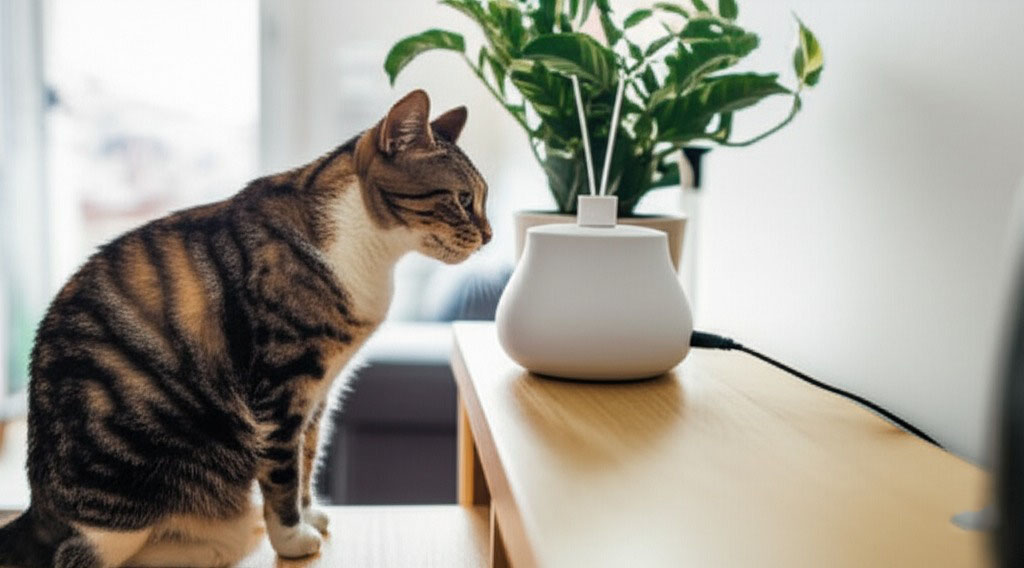
“Cats have highly sensitive respiratory systems,” says Dr. Emily Cross, a Sydney-based vet. “Even low-level exposure to certain chemicals can cause long-term issues.”
This guide unpacks which products are risky, how cats get exposed, and what to use instead. Because no one wants to trade a fresh-smelling home for a trip to the emergency vet.
Air fresheners and cat safety
“Many pet parents do not realise,” says Dr. Helen Ward, a Sydney-based veterinary toxicologist, “that what smells clean to us can be harmful—even deadly—to cats.” Her comment came during a review of plug-in diffusers commonly used across Australian households. Products containing synthetic fragrances, phthalates, and essential oils are often marketed as “natural” but may trigger chemical toxicity in pets, particularly those with sensitive respiratory systems.
Customers like Jason Cole from Brisbane recall their cat developing coughing fits shortly after installing a new lavender-scented air freshener. “It never crossed my mind that something so small could be dangerous,” Jason shared. “We tossed it out after our vet warned us it could cause long-term respiratory problems.”
Veterinary advice often stresses the importance of proper ventilation and safer scenting practices. Experts recommend avoiding products with limonene, benzene, and artificial musks.
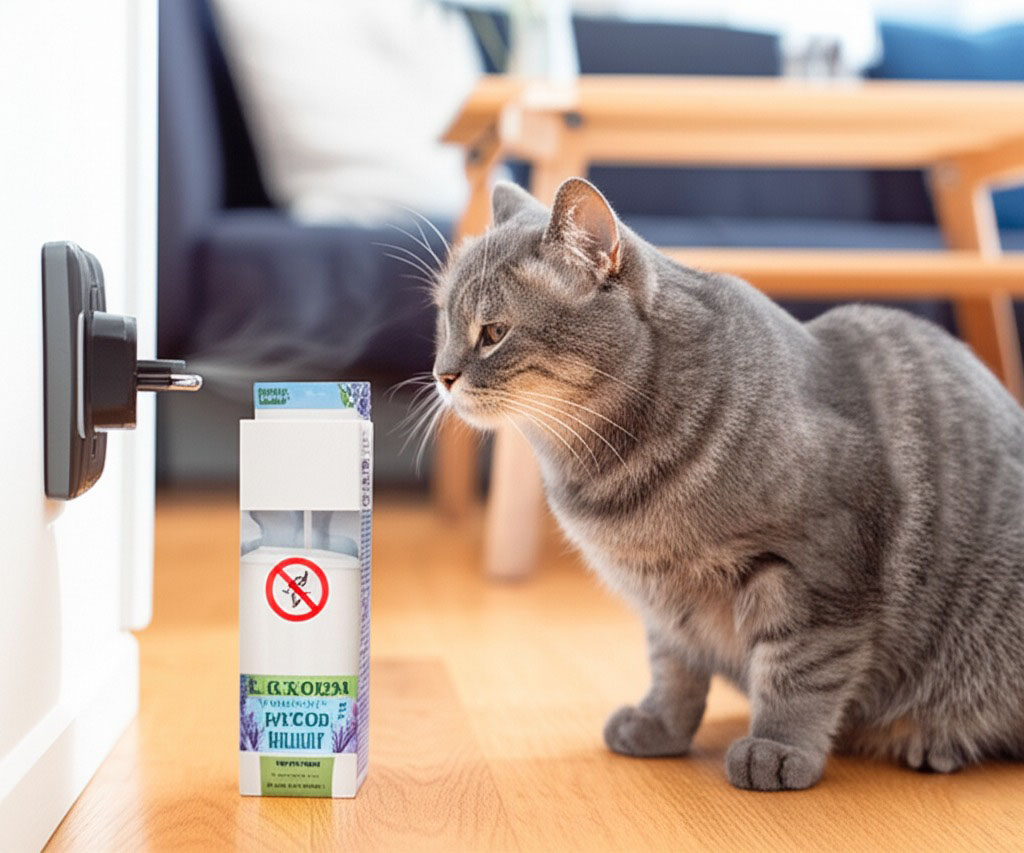
Pet safety tips include:
Keeping air freshener use minimal in enclosed spaces
Choosing unscented or enzyme-based odor neutralizers
Avoiding direct exposure around litter boxes and sleeping areas
Using charcoal bags or fresh herbs like rosemary as safe alternatives 🌿
Consumers should look for certifications like the Pet Safe Label or refer to veterinary-backed reviews. These small shifts make a big difference in preventing avoidable health symptoms linked to air freshener ingredients.
Common toxins in fragrance products
Many popular air fresheners may smell divine, but some of the ingredients inside are a chemical cocktail for cats. Let’s break down what’s really floating around in the air.
Synthetic perfumes and VOCs explained
Synthetic perfumes are a major part of what gives air fresheners their strong, lingering scent. But they’re also loaded with VOCs—that’s volatile organic compounds—like formaldehyde and benzene, which can hang in the air for hours. These chemicals may affect indoor air quality and are known to irritate feline respiratory systems.
🟢 Common VOC Sources in Homes
| Source | Chemical Released | Effect on Cats |
|---|---|---|
| Plug-in fresheners | Benzene | Respiratory irritation |
| Room sprays | Formaldehyde | Eye/nose irritation |
| Scented candles | Acetaldehyde | Breathing issues |
Proper ventilation helps, but it doesn’t solve the root issue—these fragrances just aren’t made with pets in mind.
What phthalates do to cat lungs
Phthalates are sneaky little troublemakers. They’re commonly used in plastics and scented products to make smells last longer—but that long-lasting whiff can mess with a cat’s lungs.
According to the Australian Pesticides and Veterinary Medicines Authority, exposure to phthalates has been linked to asthma-like symptoms, allergic reactions, and even long-term respiratory damage in felines. These chemicals can be found in things like PVC, vinyl flooring, and—you guessed it—many air fresheners.
“Cats are especially vulnerable because they spend more time close to the ground where these particles settle,” says Dr. Laura Chen, a Melbourne-based vet.
Essential oils that harm cats
Some essential oils might seem “natural,” but when it comes to cats, they’re anything but safe. Oils like tea tree, eucalyptus, and citrus can be toxic—even in small doses.
🛑 Inhalation: Can irritate lungs or trigger wheezing
🛑 Ingestion (via grooming): Can cause vomiting or tremors
🛑 Skin contact: May result in rashes or burns
Tea tree oil in particular has been linked to liver damage in cats. Best bet? Avoid diffusing oils altogether in shared spaces.
How preservatives build up in the body
Preservatives like BHA, BHT, and parabens don’t just vanish after exposure. They slowly bioaccumulate in the body—this is known as body burden. Over time, even trace amounts from daily exposure to scented products or treated surfaces can interfere with a cat’s metabolism, leading to chronic health effects.
Preservatives enter via skin or inhalation
They build up in fatty tissues
The cat’s detox system (mainly the liver) struggles to break them down
Not all preservatives are created equal, but when it comes to cats, less is always more. Keep an eye on ingredient labels, even for things like scented litter and air sprays.
Which air fresheners are worst for cats?
Not all air fresheners are created equal—and some are downright nasty for your feline friend. Let’s break down the worst offenders in your home.
Plug-in fresheners and chemical overload
Plug-in air fresheners release a cocktail of synthetic scents and volatile organic compounds (VOCs) that linger in the air 24/7. These VOCs lower indoor air quality and are linked to respiratory issues and allergic reactions in cats. Poor ventilation can make exposure worse. Over time, buildup of these compounds may lead to chemical sensitivity or chronic health effects. As Dr. Linda Fallon, veterinary toxicologist, notes: “Plug-ins expose pets to a constant low-dose fog of irritants—think of it like secondhand smoke for cats.”
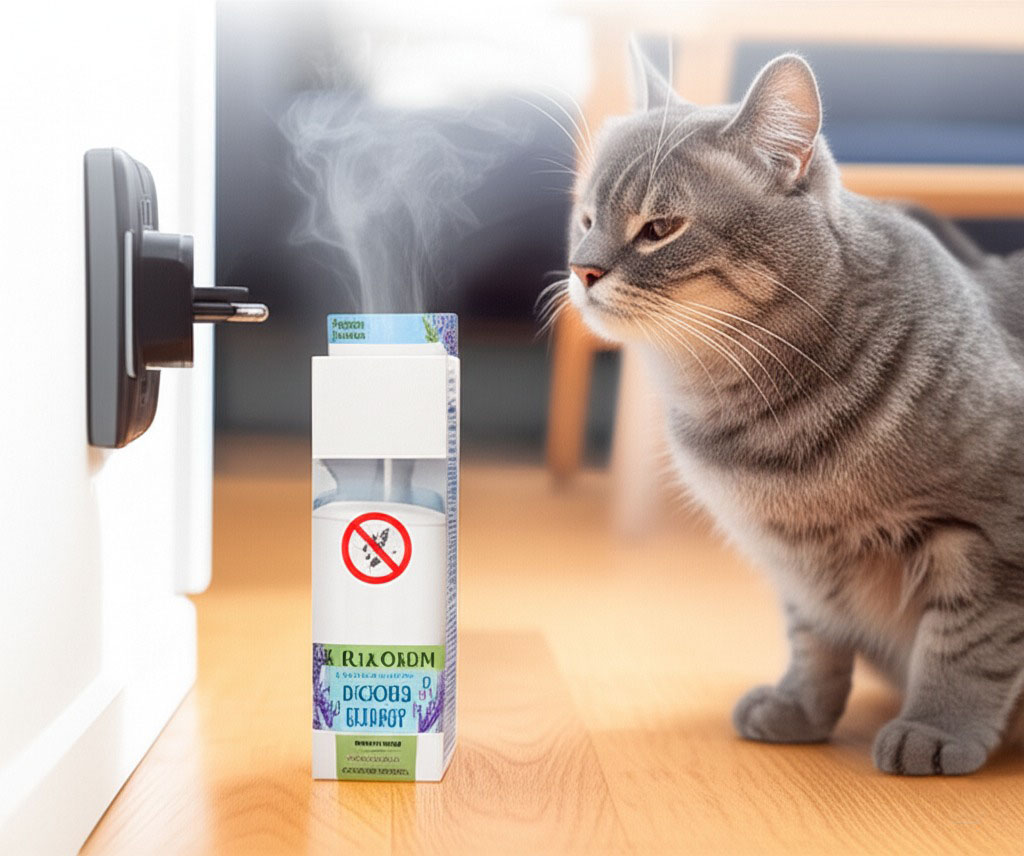
Dangers of aerosol sprays in closed spaces
Aerosol sprays are fast and convenient—but they’re trouble in small, closed rooms. Here’s why:
Contain harsh propellants and synthetic chemicals
Fine particles linger in indoor air with poor ventilation
Can trigger lung irritation, coughing, or sneezing in cats
And let’s not forget the flammability risk. Spraying near heaters or open flames isn’t just bad for your cat—it’s dangerous for everyone.
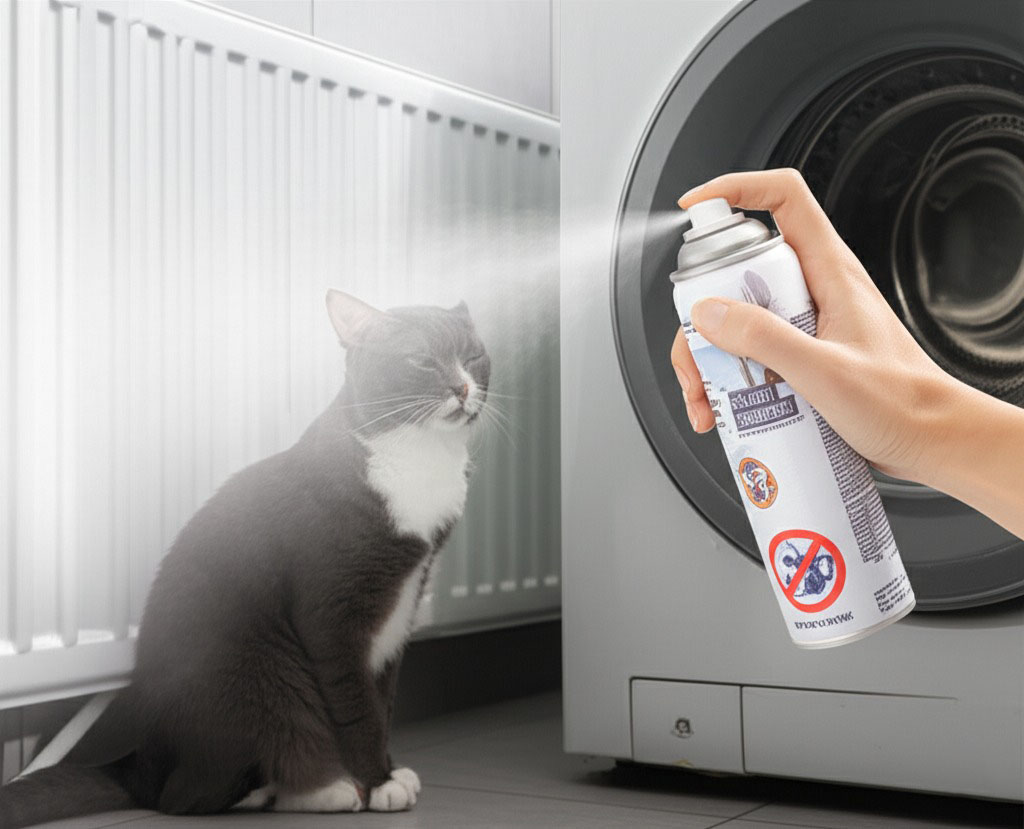
Hidden risks in “natural” scented candles
You’d think “natural” scented candles would be safer, right? Not quite.
Most still contain fragrance oils and paraffin wax, which release chemical emissions and soot when burned.
Even “eco-friendly” options can emit particulate matter and combustion byproducts that irritate feline airways.
Labels often skip over full ingredient disclosure, leaving you guessing.
So that cosy candlelit vibe? Could be quietly putting your cat’s health on the line. Best used sparingly, and only in well-ventilated areas.
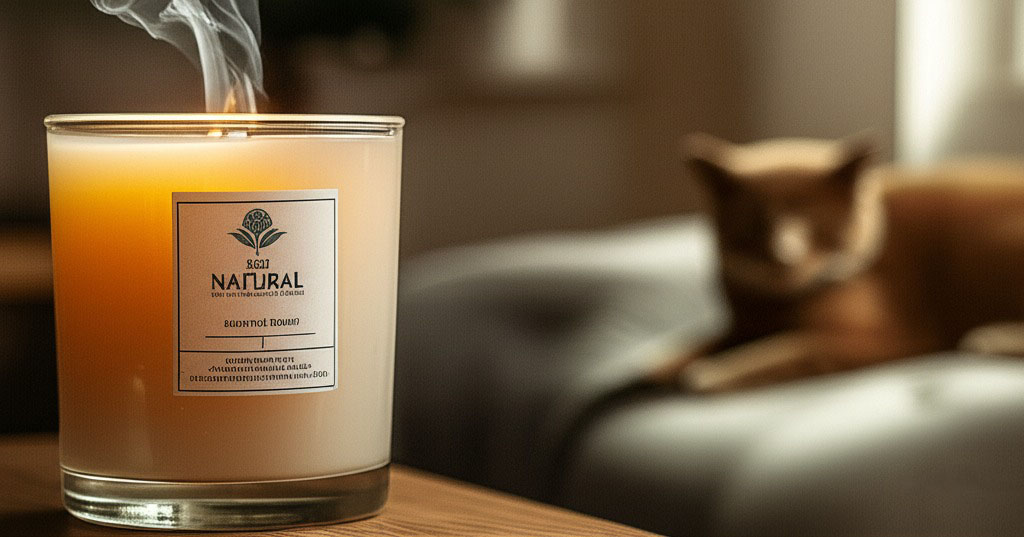
Exposure routes: How do cats get sick?
Even if you keep things squeaky clean, cats can still get crook from everyday air fresheners. Here’s how the nasties get into their system.
Toxins inhaled through daily breathing
Cats are low to the ground where airborne particles linger longer. With every breath, they’re pulling in VOCs, mould spores, and chemical fumes that irritate the respiratory system.
Allergens and dust from sprays build up indoors
Poor indoor air quality worsens asthma or hidden allergies
Inhalation of particles damages delicate lungs over time
As Dr. Tanya Clarke, vet respiratory specialist, puts it: “A spritz of scent might smell nice to you—but it can feel like tear gas to your cat.”
Grooming spreads surface chemicals internally
Cats walk, sleep, and roll on floors and furniture that carry surface residue from diffusers and sprays.
During grooming, that residue gets licked and enters the digestive system.
Over time, this chemical transfer leads to exposure in the internal organs.
It’s not just what they breathe—cats literally lick it off their own fur. A wipe-down to us becomes a contamination pathway to them. Watch out for cleaning product residue, dust mites, and anything sprayed near their hangout spots.
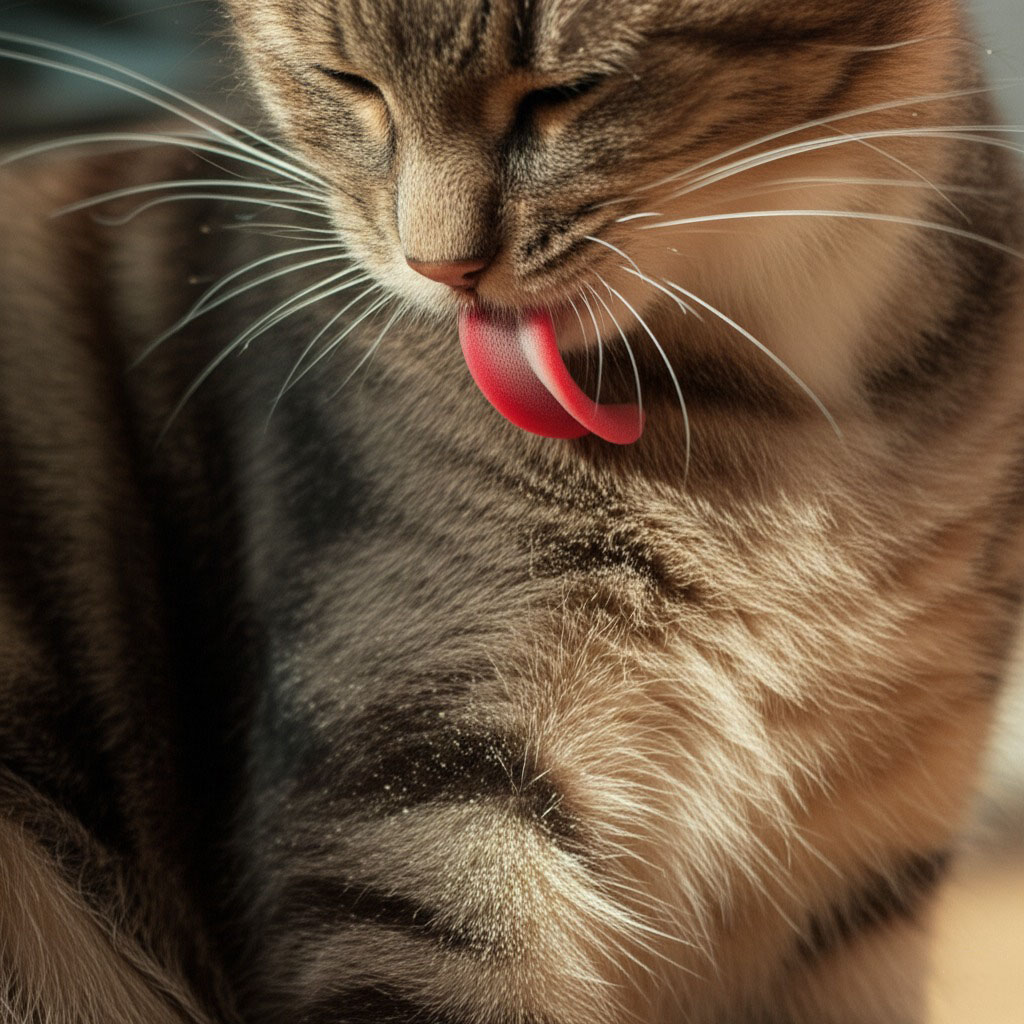
✅ Keep in mind: Cats groom up to 50% of their waking hours—meaning every surface they lie on becomes part of their diet if you're not careful.
Symptoms of fragrance poisoning in cats
Spotting symptoms early could be the difference between a close call and a trip to the emergency vet.
Sudden coughing or laboured breathing
If your cat starts wheezing or gasping out of nowhere, don’t shrug it off as a hairball. Coughing, laboured breathing, or shortness of breath can be signs of airway obstruction or respiratory distress triggered by air freshener toxins. These symptoms often appear suddenly, especially after exposure to aerosols or plug-ins in poorly ventilated rooms. Take note if their sides are heaving—get to a vet if in doubt.
Loss of appetite and strange behaviour
You know your cat best—so if they stop eating, hide more than usual, or act downright odd, something’s up. Loss of appetite (or anorexia) mixed with unusual behaviour like random aggression or hiding in weird spots might point to chemical exposure. Cats are sensitive little creatures, and even low-level contact with fragrance chemicals can throw them right off.
Lethargy after exposure to fresheners
Is your usually playful kitty suddenly lounging around like a sack of potatoes? Lethargy following exposure to household air fresheners might not just be them having a lazy day. We're talking about real fatigue, weakness, and signs that toxins have taken a toll. When those chemicals get into their system, their energy can tank quickly—like flipping a switch.
Skin rashes or eye irritation
You might notice your cat rubbing their face or scratching more than usual. That could mean dermatitis or eye irritation from chemical particles. Some symptoms to watch:
Red or inflamed skin
Itchy ears or paws
Watery, swollen eyes
These are clear signs of allergic reaction from fragrance exposure, especially if your cat’s been hanging around scented diffusers or misted areas.
When vomiting signals something serious
Not all vomit is created equal. If it’s persistent, contains blood, or comes with signs like dehydration or abdominal pain, it’s time to act.
Watch for frequency—throwing up once isn’t always bad.
But if they’re vomiting repeatedly or seem weak, that’s different.
Seek medical attention fast; it could be a sign of poisoning or a gastrointestinal obstruction.
"Repeated vomiting after scent exposure isn’t just an upset tummy—it’s often a red flag," says Dr. Jodie Walker, veterinary toxicologist.
Are natural air fresheners safer for cats?
“Natural” might sound comforting on a product label, especially when it comes to your home and your pets. Yet not all natural air fresheners are created with pet safety in mind. Many include essential oils like tea tree, eucalyptus, and citrus that are highly concentrated and can cause respiratory problems or even liver damage in cats.
Veterinarian Dr. Lisa Harper explains, “Even a few drops of oil in a diffuser can release airborne particles that irritate a cat’s lungs. We see cases of vomiting, lethargy, and wheezing far too often.” 🐾
Customer reports echo this. Melbourne cat owner Anita Reid tried a plant-based lavender spray. “My cat started sneezing within minutes,” she recalls. “We opened all the windows and stopped using it. The scent lingered, and so did the symptoms.”
⚠️ Watch for signs of exposure:
Persistent coughing or sneezing
Lethargy or hiding
Changes in appetite or behavior
Safer options include:
Fragrance-free air purifiers
Proper ventilation and natural air flow
Products certified by pet safety groups
Always check the fragrance ingredients and avoid anything not clearly labeled as safe for animals. Relying on certified brands with awards and transparent testing reports adds an extra layer of trust for your pet’s health.
Safe scenting options for cat owners
Looking for a fresh-smelling home without risking your cat’s health? These safe scenting tips will help you breathe easy—without the nasty side effects.
Pet-safe diffusers and humidifiers
Not all diffusers are created equal. Go for ultrasonic cool mist diffusers—they don’t heat oils, reducing the risk of toxic breakdowns. Avoid nebulizing diffusers that blast concentrated oils. Keep it basic: water-only humidifiers with no added fragrance are safest.
“The safest choice is a fragrance-free cool mist humidifier,” says Dr. Kayla Morris, a Melbourne-based veterinary toxicologist.
How to freshen rooms with herbs
Skip the chemical sprays. Instead, simmer a pot of dried rosemary, cloves, and orange peel on the stove. Or hang small bunches of dried lavender and mint as natural, botanical air fresheners. These herbs offer gentle, pet-safe scent without harsh chemicals. A classic Aussie trick? A eucalyptus leaf bowl (dried, not oil) near a window for breezy freshness.
Ventilation tips for closed spaces
Good airflow beats any spray. Here’s how to improve indoor air quality:
Open windows wide—morning and evening are best.
Use fans to create cross-ventilation in stuffy rooms.
Install a window vent or draft guard to boost fresh air exchange. Even five minutes of airflow can flush out pet-related pollutants.
DIY scent sachets without essential oils
Fancy a bit of DIY? Make fabric sachets filled with dried citrus peel, cinnamon sticks, and star anise. No oils, no worries—just a light, natural fragrance that’s safe for your furry mates. Stick ‘em in wardrobes, shoe cupboards, or behind the couch.
Choosing enzyme-based odour removers
Enzyme cleaners break down the organic matter that causes odours—great for cleaning up pet stains like urine or vomit. Look for products with “biological enzyme” or “protease” on the label. These work naturally without overpowering chemical scents or dangerous residues. They're a go-to for vet clinics.
| Product Type | Works On | Safe for Cats |
|---|---|---|
| Enzyme sprays | Urine, vomit | ✅ Yes |
| Bleach-based cleaners | Bacteria, stains | ❌ No |
| Scented deodorisers | Air freshness | ❌ No |
Houseplants that clean air safely
Want a breath of fresh air and some greenery? Try Areca Palm, Spider Plant, or Bamboo Palm—all known to filter out toxins like formaldehyde and benzene, and all pet-safe. Just steer clear of peace lilies and aloe vera—they're toxic to cats.
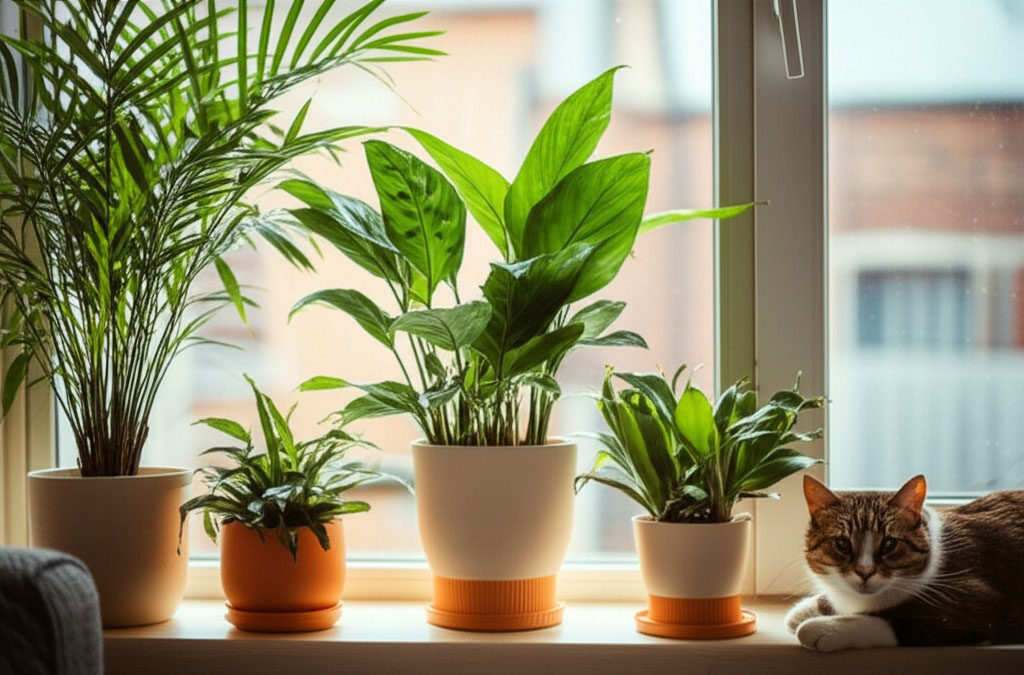
Keep plants in indirect light and dust leaves regularly for max air-purifying power. It's a win-win: better air, and a vibe your cat will love.
Air fresheners might seem harmless, but for your cat, they can pack a punch. Think of your living room like a boxing ring—those scents are punches your kitty didn’t sign up for. A fresh-smelling home shouldn’t come at the cost of your cat’s lungs.
As Dr. Miller says, “Cats inhale toxins we don’t even notice.”
Quite a few common ones can be risky, including:
Phthalates – often used to make scents last longer
Formaldehyde – a known irritant and carcinogen
Volatile Organic Compounds (VOCs) – airborne chemicals that can impact breathing
Essential oils – some like tea tree, eucalyptus, and citrus can be toxic to cats
Benzene and toluene – found in many spray aerosols
Not really. Plug-ins constantly release vapours into the air, which can build up in closed rooms and linger on surfaces. Cats breathe them in or ingest them during grooming. Long-term use could harm their liver or lungs.
Yes. Especially ones made with synthetic fragrances or paraffin wax. The smoke and scent particles can irritate sensitive feline airways. Go for unscented soy or beeswax alternatives if you're lighting a candle.
Look for subtle changes—they’re not always dramatic. You might notice:
Sneezing or wheezing
Acting more withdrawn or hiding
Skin redness or scratching
Loss of appetite
Lethargy or sleeping more than usual
Many oils that smell lovely to us are harmful to cats. Some to avoid:
Even diffusing these oils can be risky in a closed room.
Tea tree
Eucalyptus
Peppermint
Citrus (lemon, orange, grapefruit)
Pine and wintergreen
Yes, there are a few brands now focusing on pet-safe formulas. Look for:
Be wary of anything that just says “natural” without an ingredient list.
Fragrance-free or low-VOC options
Products labelled as vet-approved or tested for pets
Enzyme-based cleaners with no artificial perfumes
There are a bunch of safe and simple options:
Open windows daily for fresh airflow
Use baking soda in litter areas to absorb odours
Place bowls of white vinegar or coffee grounds in smelly spots
Try growing cat-safe plants like spider plant or areca palm for air filtering
In some cases, yes. Chronic exposure—especially to strong or chemical-heavy products—can lead to respiratory conditions, liver strain, or worsened asthma in vulnerable cats. It's not just a one-off risk.
Healthy or not, it’s best to avoid regular use of scented products in spaces your cat hangs out. Cats have a super sensitive sense of smell, and what’s mild to us can be overwhelming or even harmful to them over time. When in doubt, go scent-free.

Leave a comment